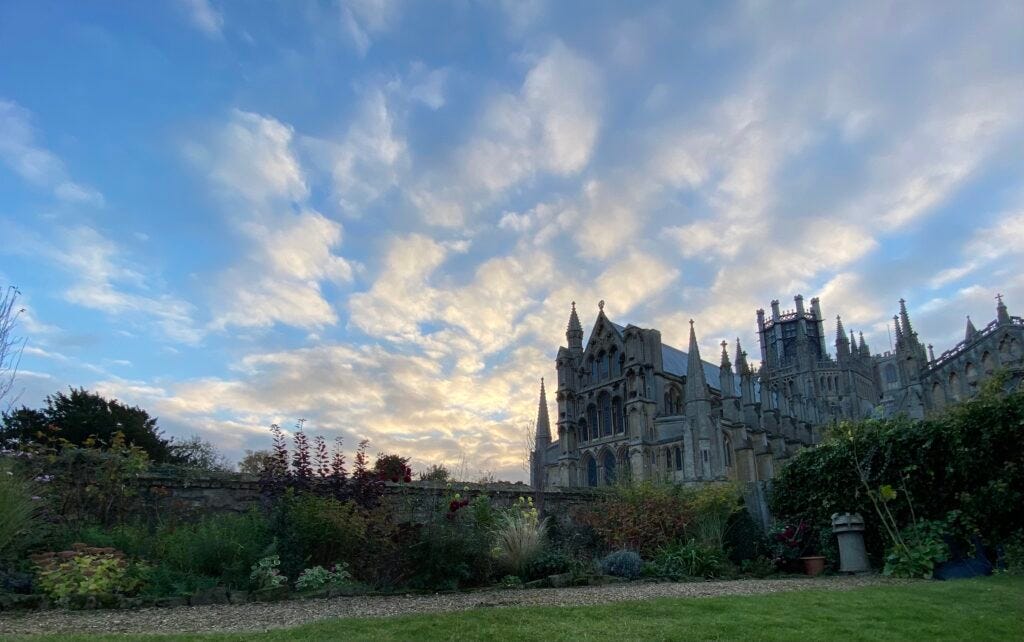Tuesday 9 November, 2021
Ely Cathedral
Seen on a November afternoon.
Quote of the Day
”The illegitimate child of Karl Marx and Catherine the Great.”
Clement Attlee’s description of communism.
Musical alternative to the morning’s radio news
Elgar | Elegy for String Orchestra, Op 58 | Roger Norrington
Long Read of the Day
Ecological Leninism ·
Long review essay on Andreas Malm’s post-pandemic climate politics by historian Adam Tooze in the London Review of Books the other day. Sobering stuff, especially when one realises that even if all the 132 nations which signed up to the Paris Accords kept their promises, the world is still on track for warming of 2.7 degrees Centigrade. Given that most of them haven’t, that figure of 2.7 is now a lower bound. Which is leading many thinkers to wonder what the politics of approaching catastrophe might be like. Not pretty is the answer, and Malm is pretty bleak about that, which is why Tooze’s take on his views is interesting.
The carbon clock is ticking. Governments and official agencies assure us that all will be well, that they can balance the risks. Some insist that technology will save us. We have achieved the impossible before, we will do it again. But why believe them? Progress towards decarbonisation has been limited. Fossil fuel interests remain stitched into global networks of power directly descended from the age of imperialism. Their political outriders may be cynical hacks, but public support for the fossil fuel status quo is all too real. The carbon coalition seems death-driven, defiant of expert advice. Centrist liberals are loud in expressing outrage, but shrink away when push comes to shove. There are periodic waves of protest. Children boycott school. There are demands for a new social contract and a just transition. A minority, tiny as yet, calls for rebellion.
With only minor alterations, this could be the portrait of a nation sliding towards defeat in a major war: relentless time pressure; limited resources rapidly running down; over-confident technocrats; promises of wonder weapons; pro and anti-war factions at loggerheads; desperate young people calling for a halt to the madness…
Felicity Allen on portraits and portraiture
As part of the ‘People Like You’ research project artist Felicity Allen was offered a residency in which to develop a new series in her Dialogic Portraits work, to consider with her sitters questions of traditional representation (such as portraiture) and ideas of the self associated with digital culture. She produced a series of portraits, shown here in Rooms, and made audio recordings with the sitters, both of which form the basis for a mesmerising 12-minute film, Figure to Ground – a site losing its system. She does portraits in watercolour, which in itself is interesting, because as a medium it somehow lacks the ‘authority’ of oils. She sent me the link out of the blue yesterday (we met once, ages ago, at a mutual friend’s party), and suddenly a busy morning was deliciously interrupted. Hope yours is too.
We Can’t Wait for Universities to Fix Themselves. So We’re Starting a New One
Hmmm… This could be interesting.
On our quads, faculty are being treated like thought criminals. Dorian Abbot, a University of Chicago scientist who has objected to aspects of affirmative action, was recently disinvited from delivering a prominent public lecture on planetary climate at MIT. Peter Boghossian, a philosophy professor at Portland State University, finally quit in September after years of harassment by faculty and administrators. Kathleen Stock, a professor at University of Sussex, just resigned after mobs threatened her over her research on sex and gender.
We had thought such censoriousness was possible only under oppressive regimes in distant lands. But it turns out that fear can become endemic in a free society. It can become most acute in the one place—the university—that is supposed to defend “the right to think the unthinkable, discuss the unmentionable, and challenge the unchallengeable.”
The reality is that many universities no longer have an incentive to create an environment where intellectual dissent is protected and fashionable opinions are scrutinized. At our most prestigious schools, the primary incentive is to function as finishing school for the national and global elite.
Among the luminaries involved are Niall Ferguson, Kathleen Stock, Dorian Abbot, Peter Boghossian, Robert Zimmer, Larry Summers, John Nunes, Gordon Gee, Steven Pinker, Deirdre McCloskey, Leon Kass, Jonathan Haidt, Glenn Loury, Joshua Katz, Vickie Sullivan, Geoffrey Stone, Bill McClay, and Tyler Cowen. They also claim as supporters a motley crew of journalists, artists, philanthropists, researchers, and public intellectuals, including Lex Fridman, Andrew Sullivan, Rob Henderson, Caitlin Flanagan, David Mamet, Ayaan Hirsi Ali, Sohrab Ahmari, Stacy Hock, Jonathan Rauch, and Nadine Strossen.
I guess that most of these elegant dudes (and they are, interestingly, mostly dudes) will not be giving up their comfortable perches in conventional institutions to sample the delights of Austin. They’ll be more like visiting profs, presumably.
Still, there’s something quaint about a group of dissidents from elite universities setting up another elite institution. My hunch, though, is that they’ll get plenty of funding from wealthy libertarians (Peter Thiel?) so maybe this academic bird will fly.
It’s also reminiscent of the New College of the Humanities which was founded by the philosopher A.C. Grayling in 2011 and is still in business, though now owned by a subsidiary of Northeastern University.
My hunch is that Harvard, that hedge fund with a nice university attached, won’t be too bothered by this University of Austin.




